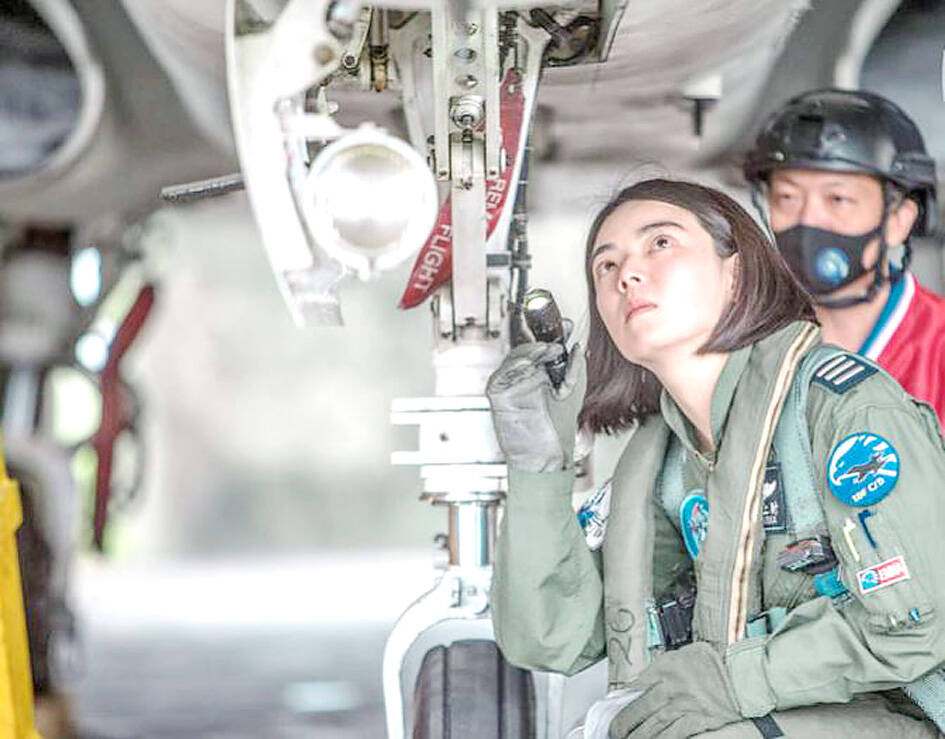An interview with female air force pilots in Taiwan published by the UK’s Telegraph newspaper on Sunday highlights their strong willpower, responsibility and resilience as female fighter pilots, despite facing increasing Chinese military threats.
The report interviewed 34-year-old Captain Guo Wen-jing (郭文靜) and 33-year-old Major Hsieh Yun-ting (謝蕓梃), who are the air force’s fourth and third fighter pilots respectively.
Guo studied business management at university and briefly considered working in a bank after graduation, but at the age of 22, she was drawn to the challenge of enlisting in the military, particularly in aviation, the report said.

Photo courtesy of Military News Agency
The promise of a steady wage cemented her decision, as she had hoped to support her family in covering expensive late-stage cancer treatments for her late father at the time.
“I thought: If the boys can do it, then girls can, too… I didn’t even tell my family what I was up to until the morning I was assigned to report for duty,” the newspaper cited her as saying.
During her childhood, Hsieh often watched planes taking off and landing at a nearby airport and military air base in Kaohsiung, and she now trains future fighter pilots on AT-3 trainer aircraft.
“I wondered if perhaps someday I could fly one of those planes,” the report cited her as saying.
On her first solo flight, she said she looked behind in the plane, not convinced that she was flying alone without an instructor, but she told herself “you got this” and succeeded, because she believed in herself, the report cited her as saying.
Days usually begin at about 5am for Guo and Hsieh, but sometimes they can start as early as 3am.
Other than their military duties, they need to manage their responsibilities at home — Hsieh is a mother of two children, aged seven and five.
As women comprise only about 15 percent of active-duty personnel in the military, and most female pilots end up flying transportation planes, there are only 20 female fighter pilots, the report said.
There were so few women when they started their pilot training about a decade ago, that “our officers placed us under a magnifying glass — at least, that’s what it felt like,” Guo was cited as saying.
Recruiting has not been easy in Taiwan, as the military’s public image has long been associated with repression, due to the history of martial law until 1987, so Guo’s two older brother still tease her for becoming a soldier and are not interested in enlisting themselves, it said.
However, Guo and Hsieh’s sense of accomplishment from having joined the elite ranks of the air force cannot be replaced, it reported.
Beijing commands six times as many warplanes as Taiwan and has increasingly sophisticated aircraft, so as tensions rise over a potential invasion of Taiwan, Guo and Hsieh might one day be at the forefront of a war with China, the report said.
Facing Beijing’s military advantages, the female fighter pilots have shown how to stay calm during their missions to intercept Chinese aircraft, as well as demonstrating determination to defend Taiwan, it added.

Chinese Nationalist Party (KMT) Chairman Eric Chu (朱立倫), spokeswoman Yang Chih-yu (楊智伃) and Legislator Hsieh Lung-chieh (謝龍介) would be summoned by police for questioning for leading an illegal assembly on Thursday evening last week, Minister of the Interior Liu Shyh-fang (劉世芳) said today. The three KMT officials led an assembly outside the Taipei City Prosecutors’ Office, a restricted area where public assembly is not allowed, protesting the questioning of several KMT staff and searches of KMT headquarters and offices in a recall petition forgery case. Chu, Yang and Hsieh are all suspected of contravening the Assembly and Parade Act (集會遊行法) by holding

PRAISE: Japanese visitor Takashi Kubota said the Taiwanese temple architecture images showcased in the AI Art Gallery were the most impressive displays he saw Taiwan does not have an official pavilion at the World Expo in Osaka, Japan, because of its diplomatic predicament, but the government-backed Tech World pavilion is drawing interest with its unique recreations of works by Taiwanese artists. The pavilion features an artificial intelligence (AI)-based art gallery showcasing works of famous Taiwanese artists from the Japanese colonial period using innovative technologies. Among its main simulated displays are Eastern gouache paintings by Chen Chin (陳進), Lin Yu-shan (林玉山) and Kuo Hsueh-hu (郭雪湖), who were the three young Taiwanese painters selected for the East Asian Painting exhibition in 1927. Gouache is a water-based

Taiwan would welcome the return of Honduras as a diplomatic ally if its next president decides to make such a move, Minister of Foreign Affairs Lin Chia-lung (林佳龍) said yesterday. “Of course, we would welcome Honduras if they want to restore diplomatic ties with Taiwan after their elections,” Lin said at a meeting of the legislature’s Foreign Affairs and National Defense Committee, when asked to comment on statements made by two of the three Honduran presidential candidates during the presidential campaign in the Central American country. Taiwan is paying close attention to the region as a whole in the wake of a

OFF-TARGET: More than 30,000 participants were expected to take part in the Games next month, but only 6,550 foreign and 19,400 Taiwanese athletes have registered Taipei city councilors yesterday blasted the organizers of next month’s World Masters Games over sudden timetable and venue changes, which they said have caused thousands of participants to back out of the international sporting event, among other organizational issues. They also cited visa delays and political interference by China as reasons many foreign athletes are requesting refunds for the event, to be held from May 17 to 30. Jointly organized by the Taipei and New Taipei City governments, the games have been rocked by numerous controversies since preparations began in 2020. Taipei City Councilor Lin Yen-feng (林延鳳) said yesterday that new measures by